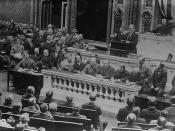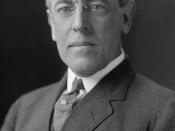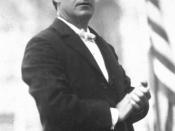The large majority of the American population all agreed that neutrality was the only course for the United States. Apart from the self interested reasons for neutrality, the length of the war's issues from the United States, the nations ethnic divisions and the economic benefits of trade with both sides Wilson believed that all sides would turn to the U.S. for aid. They would admit, he predicted, "You were right, and we were wrong"æNow in your self possession, in your coolness, in your strength, may we not turn to you for counsel and for assistance?" The 1916 election could be considered another reason for why Wilson opted for the neutral approach to foreign affairs.
If we at first analyse Wilson and his initial approach to the war we begin to understand why it may have been that he decided to stay neutral. After the recent tragedy of Wilson's wife's death it was believed by many that he was, "Hardly able to deal with routine business and in no condition to think about large and complex issues of American policy or the war".
Suggesting a possible reason for why Wilson responded to the War with a policy of neutrality. To Wilson, politically controlled and directed economic development was the basis of advancement for the U.S. in the 19th century. Capitalists he believed, desired power and profit for entirely selfish reasons and without direction, selfish competitions would produce conflict and violence which is something Wilson wanted to avoid on international as well as on national or private levels. Which also supports his eagerness to preserve the neutrality of the U.S. during the Great War.
On the first day of the battle of Somme, on July 1, 1916, 20 000 British soldiers were killed and 40 000 others wounded - all in...


